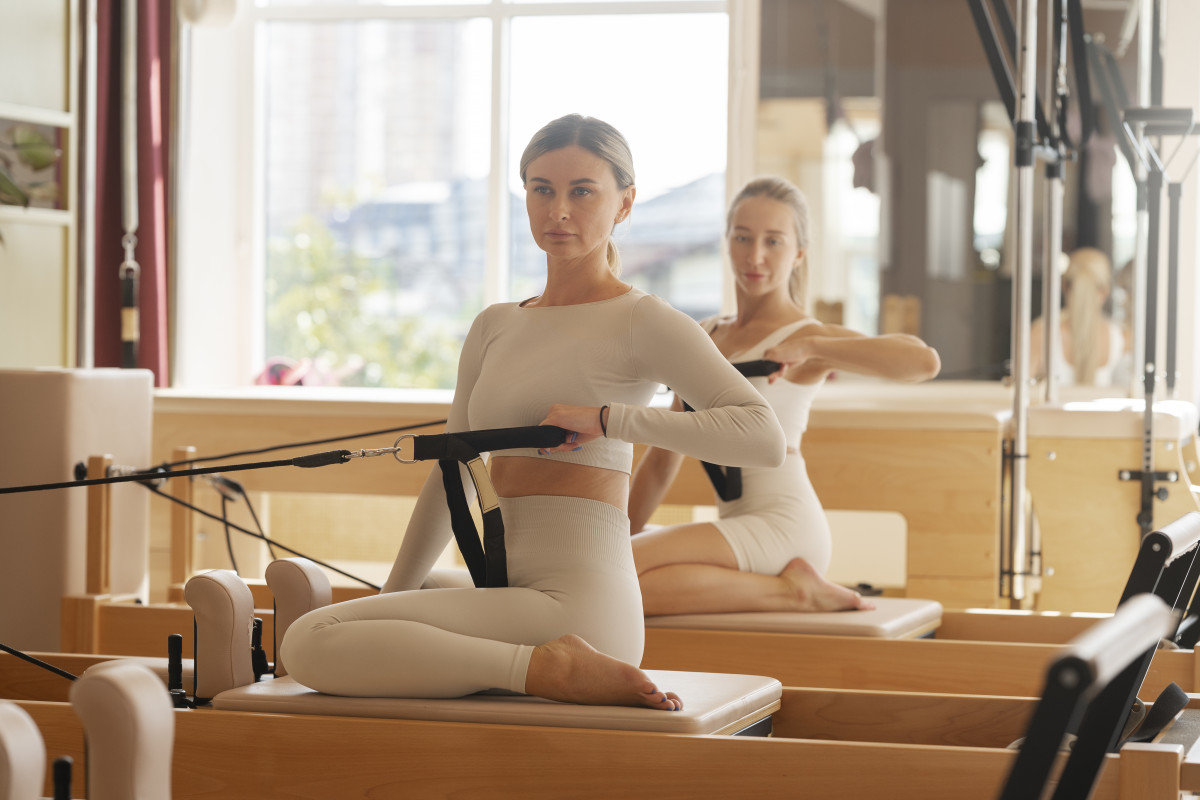It’s important to approach it with caution and awareness for optimal results and injury prevention. Here’s a breakdown of the pros and cons:
Benefits of Daily Pilates:
- Improved Overall Fitness:
- Strengthens core and major muscle groups: Leading to better posture, stability, and balance.
- Increases flexibility and range of motion: Enhancing agility and everyday movement ease.
- Builds lean muscle mass: Boosting metabolism and improving body composition.
- Promotes Mental Well-being:
- Improves mental focus and clarity: Mindfulness exercises enhance body awareness and reduce stress.
- Promotes relaxation and reduces tension: Effective tool for managing stress and anxiety.
- Boosts confidence and self-esteem: Feeling strong and capable translates into a positive mental outlook.
- Potential for Faster Progress: With consistent practice, you might see faster improvements in strength, flexibility, and overall fitness compared to less frequent routines.
Considerations for Daily Pilates:
- Listen to your body: Take rest days when needed to allow your body to recover and prevent injuries.
- Vary the intensity and format: Alternate between beginner, intermediate, and advanced exercises to avoid plateaus and keep your body challenged.
- Focus on proper form: Prioritize proper form over speed or complexity to ensure safety and maximize benefits.
- Consider professional guidance: Consulting a certified Pilates instructor can help design a personalized plan, ensure proper technique, and offer modifications if needed.
Alternatives to Daily Pilates:
- 3-4 sessions per week: This frequency can still offer significant benefits while allowing sufficient recovery time.
- Cross-training: Combine Pilates with other activities like swimming, walking, or yoga for a well-rounded fitness routine.
- Active rest days: Engage in low-impact activities like gentle walks or yoga stretches on rest days to maintain activity and promote recovery.
Pilates can add a wealth of benefits to your life, both physically and mentally. Whether you’re a seasoned athlete, a weekend warrior, or someone just starting your fitness journey, Pilates offers something for everyone.
Here’s how Pilates can positively impact your life:
Physical Benefits:
- Improved Strength and Core: Pilates strengthens core muscles, which are essential for good posture, stability, and balance. This translates to a reduced risk of falls, better athletic performance, and improved ease in everyday activities like lifting groceries or climbing stairs.
- Enhanced Flexibility and Mobility: Pilates exercises promote flexibility and range of motion, making you feel more limber and agile. This can improve your performance in other activities, reduce stiffness, and even alleviate pain associated with tight muscles.
- Increased Body Awareness: Pilates emphasizes body awareness, helping you understand how your body moves and functions. This improved awareness can lead to better form in all physical activities, and a heightened sense of mind-body connection.
- Potential for Pain Management: Studies suggest Pilates may help manage pain from conditions like arthritis and back pain by strengthening core muscles and improving posture.
Mental Benefits:
- Stress Reduction and Relaxation: Pilates incorporates mindful breathing techniques and controlled movements, promoting relaxation and stress reduction. This can help you manage daily stress, improve sleep quality, and enhance overall well-being.
- Improved Mental Focus and Clarity: Focusing on proper form and breathing during Pilates exercises can help improve concentration and mental clarity. This can benefit your performance in work, studies, or everyday situations.
- Boosted Confidence and Self-Esteem: As you see improvements in your strength, flexibility, and body awareness, your confidence and self-esteem can naturally increase. This positive self-image can spill over into other aspects of your life.
Pilates can be adapted to various fitness levels and needs:
- Beginner-friendly: Even those new to exercise can find modifications and beginner-level classes to participate safely and effectively.
- Scalable: As you progress, you can gradually increase the intensity and complexity of your workouts to continue challenging your body and seeing results.
- Low-impact: Pilates is generally low-impact, making it suitable for individuals with pre-existing conditions or limitations.
Incorporating Pilates into your life doesn’t have to be overwhelming:
- Start with a few sessions per week: You can start with 2-3 sessions a week and gradually increase as your fitness level improves.
- Join a class or find online resources: Consider taking a class at a local studio or exploring online resources for guided workouts.
- Invest in a Pilates mat and props: A mat and basic props like a yoga strap and small ball can enhance your home practice.
- Listen to your body: Don’t push yourself beyond your limits. Take breaks when needed and stop if you experience any pain.
Remember, consistency is key: The more you practice Pilates, the more you’ll reap its benefits. So, unroll your mat, take a deep breath, and experience the transformative power of Pilates!
Conclusion:
Daily Pilates can be a fantastic way to boost your fitness and well-being, but it’s crucial to prioritize safety and listen to your body. Consider incorporating rest days, varying your workouts, and seeking professional guidance if needed. Remember, consistency is key, but so is mindful practice and allowing your body time to recover.
Discover more from Pilates All Ages
Subscribe to get the latest posts sent to your email.
